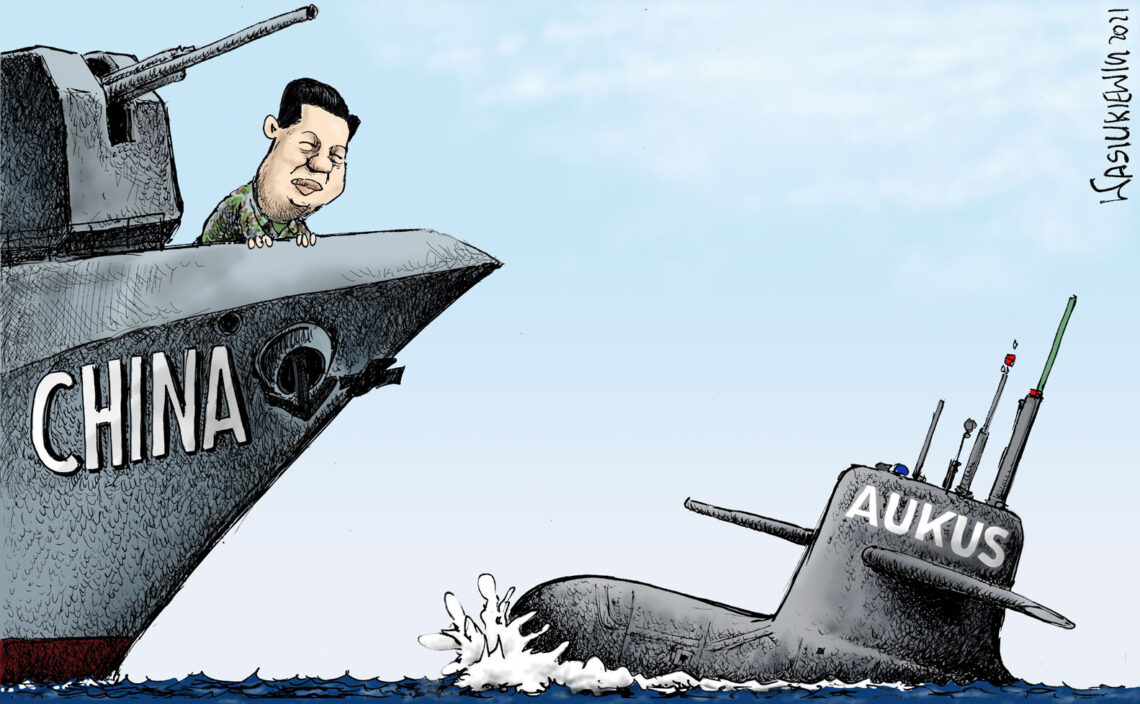China, the elephant in the geopolitical room
When Australia, the United Kingdom and the United States announced the formation of a new security pact between them, China reacted with thinly veiled threats directed at Canberra. Feeling cast aside, the French government also expressed its indignation.

Australia, the United Kingdom and the United States have announced the formation of a trilateral security pact under the acronym AUKUS.
According to official communication, the maritime defense project will include:
- enhanced air cooperation through the rotational deployment of U.S. aircraft of all types in Australia and appropriate aircraft training and exercises
- enhanced maritime cooperation by increasing logistics and sustainment capabilities of U.S. surface and subsurface vessels in Australia
- enhanced land cooperation by conducting more complex and more integrated exercises and greater combined engagement with allies and partners in the region
- the establishment of a combined logistics, sustainment, and maintenance enterprise to support high-end warfare and combined military operations in the region
This cooperation will complement the existing Quad, an alliance between Australia, India, Japan and the U.S. AUKUS reflects the especially close ties between Washington, London and Canberra, which share highly confidential military technology. Both the Quad and AUKUS are the result of increasingly assertive Chinese behavior in the Indo-Pacific area. This synergy is probably facilitated by the Five Eyes, an intelligence partnership between the traditionally close Anglo-Saxon countries of Australia, Canada, New Zealand, the UK and the U.S.
Reactions
Beijing responded with outrage. There were even suggestions that Australia, a nonnuclear power and signatory of the non-proliferation pact, could become the target of nuclear attacks for hosting American bases. (Under the veil of diplomacy, Chinese media did not mention who would be the attacker.)
The U.S.-Australia transaction was not directed at France.
The new pact kicked off with a conspicuous start. Australia canceled a contract for the purchase of submarines from France, agreeing instead to build eight nuclear-powered submarines with American technology – which the U.S. would not usually share, even with allies. Canberra stressed that the submarines would not carry nuclear weapons, as the country’s legislation forbids nuclear armament. Since the submarines will not be ready before 2030, Australia might rent some in the near future.
The transaction was strongly criticized by China, who argued that promises not to arm the submarines with nuclear weapons did not amount to much. The strongest reaction came from France, although there is no doubt that Canberra will pay all agreed penalties for the cancellation of the contract. Paris made harsh declarations, saying the U.S. is unreliable and that Australia had betrayed a close ally. Ambassadors were recalled from Washington and Canberra.
This is an unprecedented act that shows how deeply the French feel humiliated. The situation robbed them of their illusion that post-Trump America would consider France a primary ally. It also undercut France’s importance as a player in the Pacific. There are two French overseas territories there. Paris is also reconsidering its future in NATO. Paris will need face-saving operations to reestablish the necessary diplomatic talks.
Threats
Ultimately, the U.S.-Australia transaction was not directed at France. President Xi Jinping’s crackdown on society, the economy and the party show that China is gearing up to act on its hegemonic designs. Its growing foreign presence and military investments point in the same direction. Australia understandably feels profoundly threatened. A close association with the U.S. will provide effective deterrence, and nuclear-powered submarines are far more powerful than conventional diesel ones. They are more difficult to detect and can stay submerged much longer. But still, the move touched a nerve in Paris, much like Switzerland’s decision to buy the U.S. F-35 fighter planes instead of the Eurofighter Typhoon or the French Rafale. President Macron has refused to meet members of the Swiss government since.
Brussels and countries such as Germany are trapped between their claims of moral superiority and their commercial interests.
But what about the European Union and other European countries? Brussels and Berlin are making rather specific declarations about their “important” role in the Indo-Pacific. Ursula von der Leyen touched on the issue, but so far without tangible results. The same can be said about relations with China. Brussels and countries such as Germany are trapped between their claims of moral superiority and their commercial interests. This weakness and indecisiveness can lead to the worst outcomes on both fronts – compromised values and losing the Chinese market. Astonishingly, the government in New Zealand has adopted a similar policy and hopes to avoid conflict, even though it faces the same challenges as Australia.
AUKUS is a very clear sign that the Anglo-Saxon countries will fight China’s hegemonic aspirations with all means available. Europe (especially the larger countries like Germany and France, but also the European Commission) and Russia will have to define their position. Unfortunately, the West is pressuring Russia in a way that brings Moscow closer to Beijing. The Kremlin tends to opt for pragmatic policies; the main goal of the Russian administration is to maintain the country’s sovereignty.
